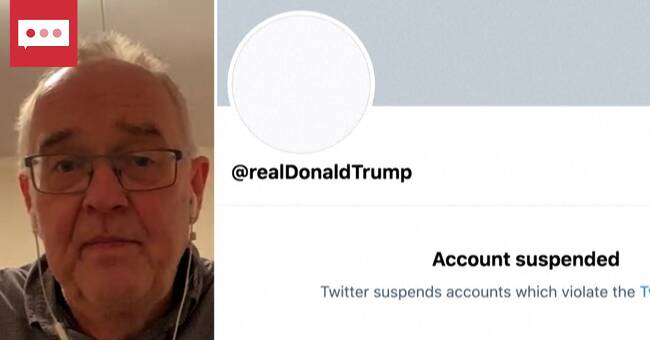During the night towards Saturday, the social media platform Twitter announced that the outgoing US President Donald Trump's account will be permanently deleted as the company believes that the president has incited violence.
The decision has been debated and has been praised by some but criticized by others.
The press and freedom of expression expert Nils Funcke belongs to the latter category.
According to him, the decision was deeply unfortunate and he believes that in the long run it is a threat to freedom of expression.
Twitter is admittedly a private company and thus has the right to decide for itself what is to be published, Funcke points out.
But since the company in practice has a monopoly on its operations, they also have a social responsibility, he says.
"Somewhere there is a border where society can deprive them of the opportunity to set their own rules," he says, adding that companies such as Twitter and Facebook should be considered distributors of opinions.
The responsibility for what is to be prosecuted should lie with society and its courts - not with IT giants.
"Closest to the Wild West"
Nils Funcke thinks that Twitter has been inconsistent about which statements they have chosen to delete.
- It is almost the Wild West over what is published and what is removed.
Funcke also believes that if Twitter were to have criminal liability, it would entail a great risk of self-censorship because one does not want to risk prosecution.
- I am afraid that it will then be arbitrariness and daily form that decides what is published.
No obstacle to incitement
At the same time, Twitter has been criticized for not shutting down Trump before.
Critics say that perhaps Wednesday's storming of the US Congress, in which five people lost their lives, could have been avoided.
However, Nils Funcke does not have much left over for that reasoning.
- He has other opportunities to incite people, it does not have to happen on Twitter, he says.
Threats to freedom of expression
As Twitter and other IT giants have begun to delete statements and close accounts, they have also crossed a line and risk a huge chain reaction, which according to Nils Funcke in the long run threatens freedom of expression and thus democracy.
- The risk is that the internet is limited in such a way that you get some form of total control of the network from an individual player, he says.

